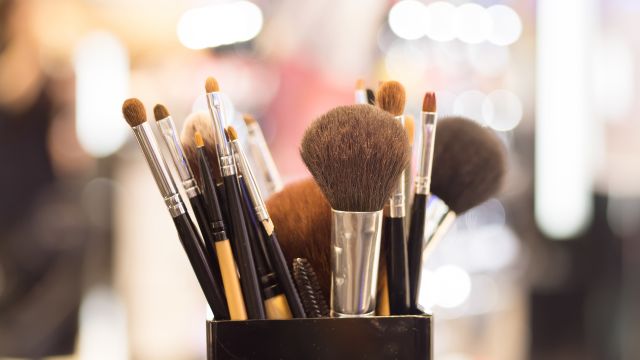It’s likely you’ve had the same skin and makeup routine for years, but you may want to think about updating your regimen. Why? Some of those habits may be irritating your skin, and might even encourage wrinkles—and nobody wants those.
Here are seven makeup and skin mistakes you may be making, plus how to reverse the damage and keep your skin glowing going forward.
Mistake #1: You never wash your makeup brushes
Do you toss your makeup brushes back into your makeup bag day after day? It might be time to stop. Dirt, oil and yeast can build up between the bristles on your brushes, and may cause your skin to break out.
Fix it: Wash your makeup brushes once a week with soap and water or with brush cleaner you can get from the drugstore. Dermatologists also recommend that you avoid sharing makeup brushes, since the spread of germs can cause acne.
Mistake #2: You forget to wash your face at night
After a stressful day, it’s very easy to crawl into bed without cleansing your face, but leaving makeup on all night may lead to oil buildup, breakouts, infections, rashes, enlarged pores, wrinkles and a dull complexion.
Foundation and concealer can clog your pores and cause you to breakout. While eye makeup like mascara and eyeliner left on overnight can clog your eyelid pores and cause an uncomfortable stye, or infected eyelash follicles. Sleeping on your pillow with makeup on can also cause an eye infection or inflammation.
A clean face at night gives your skin room to breathe and helps prevent fine lines. When your skin is able to breathe at night, you’ll improve your complexion and the tightness and elasticity of your skin.
Fix it: In general, it’s best to wash your face once in the morning and one at night, and after heavy sweat sessions. Wash your face for 30 seconds each night—you’ll want to use warm water and mild, fragrance-free cleaners. Cleansers with a neutral pH can prevent irritation and dryness. It’s best to talk with your dermatologist about the products right for you and your skin type.
Mistake #3: You don’t replace your mascara often enough
It’s important that you’re careful when it comes to makeup products that go on or around your eyes and eye lids. Every time you swipe your mascara brush onto your lashes, microorganisms latch on to the brush and then head back into the tube. An old mascara tube can be a breeding ground for certain germs to grow.
Fix it: If you use mascara every day, replace your tube every two to three months. If you use it only occasionally, it should last for six months.
Mistake #4: You constantly touch your face or pop pimples
Both popping a facial pimple and resting your hand on your chin while reading may seem tempting and unavoidable, but both can wreak havoc on your skin.
Popping or squeezing a pimple may actually make it worse, and may even cause scarring. Touching your face with your hands unnecessarily throughout the day brings dirt and oil to your face, which can cause breakouts, too.
Fix it: Make a conscious effort to keep your hands away from your face during the day, and if you do get a pimple, treat it with medication or cover it up with oil-free makeup. If you’re having frequent breakouts, talk to your dermatologist about medications that might help.
Mistake #5: You’re an exfoliating pro
Exfoliation, or the removal of the topmost layer of dead skin cells, can improve your skin’s appearance. But scrubbing your skin with too much pressure or using the wrong type of cleanser can cause irritation and premature aging.
Exfoliation can help topical skin treatments work more effectively, and can also leave your skin looking and feeler brighter. But exfoliating—especially heavy exfoliation—is not for everyone. If you have inflammatory acne or rosacea, exfoliation may make your condition worse.
Fix it: As a general rule, if you have dry or sensitive skin, it may be better to get salicylic acid peels at your dermatologist’s office rather than exfoliating at home. If you have thick, oily skin, it’s probably okay to use over-the-counter salicylic acid washes or mechanical exfoliation products like motorized brushes.
So how often should exfoliate? It’s different for everyone. If you have oily skin, you may need to do it once a day, but if you have sensitive skin, maybe just one or twice a week. Any peels or procedures done at the dermatologist’s office are typically administered over a couple of weeks. No matter what your skin type, talk to your dermatologist before trying exfoliators.
Mistake #6: You forgo a daily facial moisturizer
You’ve heard it time and time again, and for good reason: a facial moisturizer (or any moisturizer for that matter), can trap water in the skin, leaving the skin looking youthful and hydrated.
Fix it: Apply a facial moisturizer under your makeup each morning, and be sure to use it before you hit the hay, too. If you have rosacea, your skin is going to be more sensitive to certain ingredients, so look for moisturizers with lipids like ceramides. If you have acne, choose moisturizers that are oil-free and non-comedogenic so they won’t clog your pores.
Mistake #7: You skimp on sunscreen
About one in five Americans will develop some form of skin cancer in their lifetime. Sunscreen can help protect you from skin cancer, but can also protect you from premature skin aging (aka wrinkles).
Fix it: Even on cloudy days, experts recommend you use a daily sunscreen on any part of the body that’s not covered by clothing, whether it be a sunscreen itself or sunscreen that’s part of your foundation or primer
Choose broad-spectrum sunscreens that are SPF 30 or higher and water resistant. If you do head outdoors, stay in the shade as much as possible and cover your body with protective clothing like hats, sunglasses and long-sleeved shirts. And whatever you do, avoid tanning beds; use self-tanning lotions or sprays instead.






